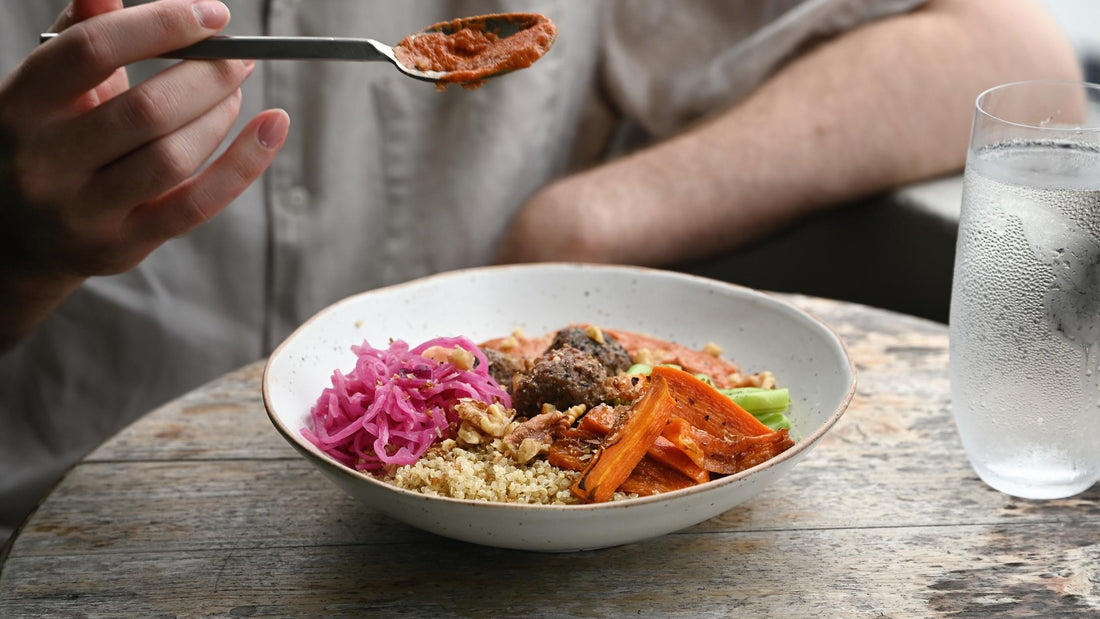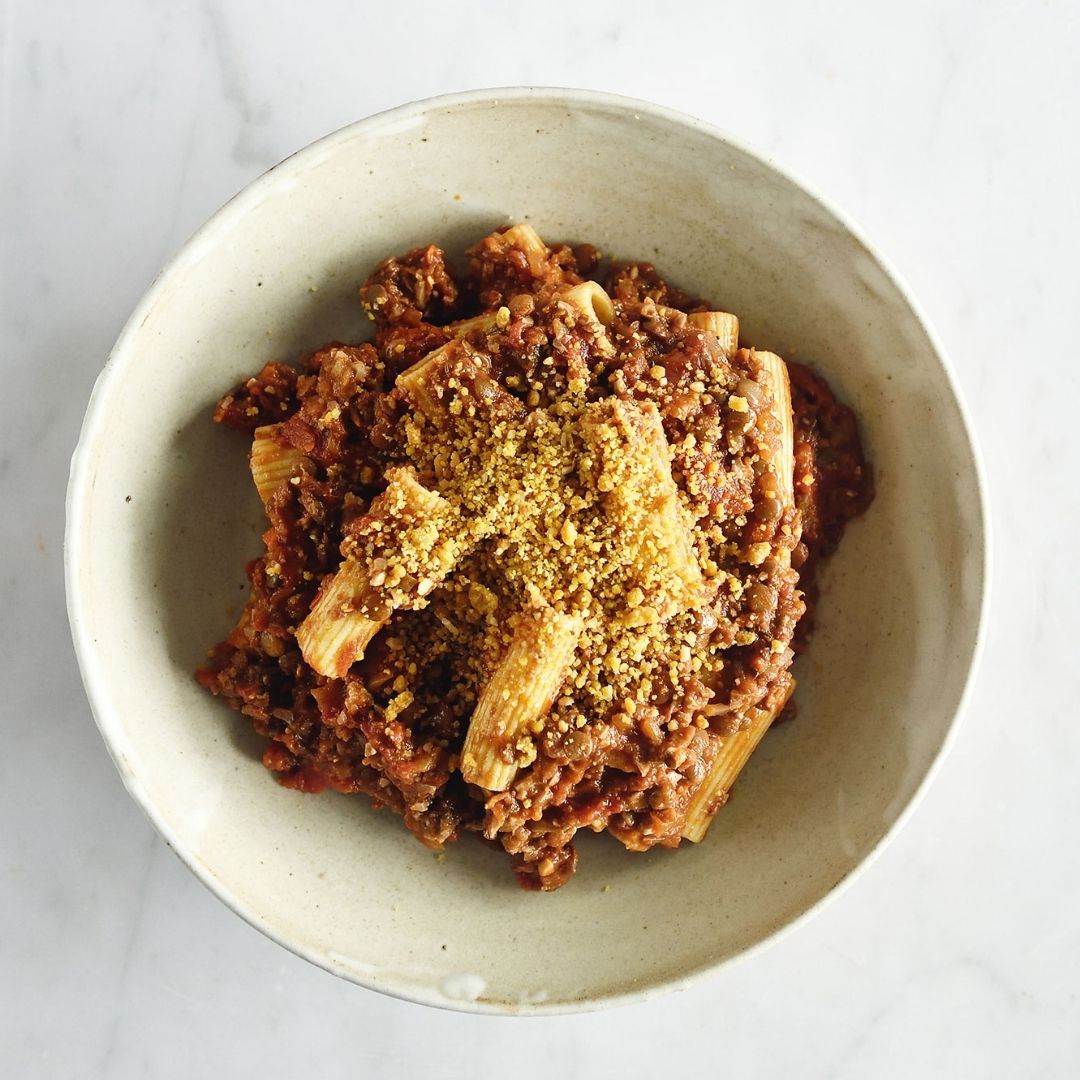
Five Surprising Things We Learnt Using Impossible on our Menu
Share

At FABA, as a 100% vegan, plant-based kitchen, we are often asked for our opinion on plant-based meats. We have incorporated one into our menu on our newest dish and the findings are surprising!
So far all of our creations exclusively use whole plant protein, but we wanted to experiment with using Impossible in our newest dish, a Tuscan Meatball Bowl, to see how it cooks up, and we are going to share our findings on the nutritional value, taste, and price below.
Impossible Foods' Vitamin B-12 Content is Insane for a Vegan Meal
A pain-point for a plant-based diet is finding a source of vitamin B, especially with the well document struggles finding B-12. Most of the ingredients that are rich in B-12, like meat, dairy and eggs, are not eaten on plant-based diets. To make up for this products are available to support vegans, like fortified plant based milks, cereals or niche ingredients like nutritional yeast.

Impossible has been enriched with Vitamin B-12 but the total content available in the product is shockingly high (so high its content is as high as omnivorous diets). In our upcoming Tuscan Bowl, we have over 250% the recommended daily intake of b-12 in our dish. When we structure our dishes, building in B-12 is often a challenge, but with Impossible it's easily achieved and then some.
Impossible's Protein in comparison with whole plant sources of protein is higher
It also can't be denied that the Plant-Based meat was unquestionably higher in protein per 100g with conventional vegan protein sources.

Though all things come with balance, it's important to note that the cost of impossible is still comparatively high, especially when you look at it as a source of protein in comparison with more conventional ingredients like tofu. Tofu is 1/6th of the price of impossible on a 100g of protein basis. When these are all added up there's compelling arguments for and against.

B-12 and Protein aren't the only nutritional content that's gone up, and that's not necessarily a good thing
At FABA, we calculate all of the nutritional information ourselves, and we aim to make our dishes as nutritionally complete as we can. In our previous dishes we have used plant proteins such as tofu, chickpeas, and black beans. These are great for a variety of reasons. As all these ingredients are very close to being whole plants and as such have good amounts of fibre, low amounts of saturated fats and also low in salt.
Now when we look at plant-based meat alternatives, such as Impossible Meat, we found the inverse to be true, the nutritional content had lower amounts of fibre than proteins like black beans, as well as higher amounts of saturated fat sodium.

When thinking holistically about the nutritional content of Impossible Plant-Based meats, we have to say they are a great compliment to a plant-based diet. For all the attributes where the plant-based meat is inferior to traditional plant-based sources (fibre, saturated fat, salt) there are other equally important attributes where plant-based meat is superior (protein, vitamin-B12). We see that as part of a whole diet, they are a great addition to our dishes.
In Taste and Cooking, Impossible Compliments our Dishes Seamlessly
At FABA our meals are cooked and then flash frozen before being delivered to our customers to heat, eat, and enjoy in minutes. Flash freezing is a great way of preserving not only the nutritional value of our ingredients but to also lock in our amazing flavours.
When it comes to freezing, not all ingredients are made equal. For example, traditional meat products can suffer horrifically when cooked, frozen and then reheated as they hold water, leaving a pretty terrible, watery residue.
To launch a new meal at FABA we test the process of flash freezing our dishes and then reheating them to ensure this process delivers great meals. Our fear was that the Plant-Based meats would behave in a similar manner to some Animal-Based meats and suffer from poor texture upon re-heat.
In the context of the Impossible Meat in our Tuscan Bowl, we crafted them into “no-meat” meatballs and pan-frying them before flash-freezing. When cooked fresh, like the many Impossible burgers, the meatballs have a great taste and texture, the question would be how they would taste after being flash frozen.
As it would turn out, our scepticism was misplaced. The meatballs are fantastic!
Impossible is an easy ingredient to work with
As a producer of food, we like to make things ourselves, but when integrating a new ingredient into a dish we don’t want to have to do too many processes. For our Tuscan Bowl we have multiple separate components that need to be prepared and cooked:
- Plant-based meatballs
- A sun-dried tomato sauce
- Roasted carrots
- Pickled red cabbage
- Steamed french green beans
- White quinoa
- Chopped walnuts

So any time where we can simplify the production process of one or more components is very helpful (efficiency is great, who would have thought?).
We were unsure on how much work we would have to do to make the meatballs taste amazing. The potential pitfall in using a plant-based meat is that it may require additional work to achieve the desired taste and textures such as addition of herbs and spices for flavour or the addition of tofu or another bean to give better texture.
Once again the end result was fantastic. After forming the plant-based meat into the desired shape and weight, the only other required step was to cook the balls and integrate them into the dish. As a lover of operations and efficiency, this was music to my ears.
Final (Tasting) Notes
The R&D process for this dish has been a fascinating journey for us to understand how the future of food ingredients actually performs in our test kitchen and then in the scale up to full production. We’re really excited about these dishes and we hope you enjoy them as much as we have making them.
The new dishes will launch over the course of the month but if you would like to sample some of our current dishes please head over here.
Till next time.




